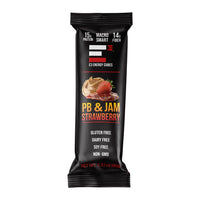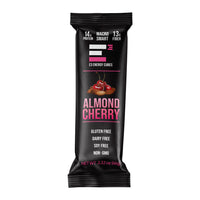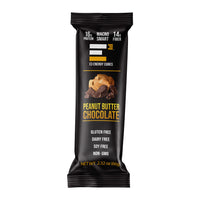The Best Soy-Free Protein Bars for a Clean and Healthy Diet
Finding the right protein bar can be challenging, especially if you're avoiding soy due to allergies, sensitivities, or dietary preferences. Soy is a common ingredient in many protein bars, but for those seeking alternatives, plenty of options provide high-quality protein without using soy, such as our Peanut Butter Lovers Pack.
This article will go in-depth about the best soy-free protein bars available, highlighting products that meet your protein needs and align with a clean and healthy diet. Whether you're looking for a snack to fuel your workouts, manage hunger between meals, or support your overall wellness goals, these bars make for a nutritious solution.
Why Opt For a Soy-Free Diet?
Allergies and Sensitivities
A major reason individuals choose a soy-free diet is due to allergies or sensitivities. Soy can cause reactions ranging from mild to severe, including digestive discomfort, skin rashes, and anaphylaxis. For those with soy allergies, avoiding soy-containing foods, including soy protein isolates often found in protein bars, is essential for maintaining health.
Hormonal Balance
Soy contains phytoestrogens that can mimic the hormone estrogen in the body. Some studies suggest that consuming large amounts of soy may affect hormone levels, potentially disrupting the endocrine system. For individuals concerned about hormone-related issues, opting for soy-free protein bars, like our E3 Mini Variety Pack, ensures they can meet their nutritional needs without introducing these compounds into their diet.
Diverse Dietary Needs
Many people following gluten-free, dairy-free, or vegan diets struggle to find suitable snacks. Thankfully, dairy-free, soy-free protein bars exist, offering clean, wholesome nutrition without compromising dietary goals. If you’re looking for even more options, check out The Ultimate Guide to Gluten & Dairy-Free Protein Bars to discover additional choices.
What Type Of Protein Do You Get From Soy-Free Protein Bars?

Soy-free protein bars typically offer a variety of high-quality proteins like whey, pea, rice, or hemp. Each provides unique nutritional benefits. Whey protein is derived from dairy and is ideal for muscle repair, while plant-based options like pea protein are rich in essential amino acids. If you're looking for a complete amino acid profile without soy, you can find blends of pea, rice, and hemp proteins in many products.
Who Can Have Gluten And Soy-Free Protein Bars?
Gluten and soy-free protein bars cater to a wide range of individuals, especially those with food allergies or dietary restrictions. People with celiac disease can safely consume them, while individuals with soy allergies or sensitivities benefit from allergen-free alternatives.
Vegans, vegetarians, and those following dairy-free diets can also find suitable options. Our Lemon Blueberry Protein Bars offer a clean, allergen-free nutrition experience while delivering delicious taste and balanced macronutrients.
Are There Any Drawbacks Of Soy-Free Protein Bars?

While soy-free protein bars offer many benefits, there are some potential drawbacks. They may be less widely available than soy-based options, and some may lack a complete amino acid profile unless they contain blended proteins. However, high-quality products like E3 Energy Cubes ensure you get a balanced, nutritious snack without the need for soy.
Things To Consider When Shopping For Best Soy-Free Protein Bars

Protein Source
When selecting the best soy-free protein bars, it's essential to check the protein source. Whey, pea, rice, and hemp proteins each offer different amino acid profiles, so choose one that aligns with your dietary needs.
Ingredient Quality
Check the ingredient list for natural, whole-food ingredients. If you're also avoiding dairy, opt for dairy and soy-free protein bars to align with your dietary preferences.
Nutritional Content
A good soy-free protein bar should have a balanced macronutrient profile. If you want more guidance on tracking macronutrients, read What Are Macros & Should You Be Tracking Them? to understand how protein, carbs, and fats contribute to your fitness goals.
Taste and Texture
Finding a bar that tastes great and has a satisfying texture is key. If you're looking for better-for-you treats, check out our guide on Better-For-You Treats for more ideas.
Wrapping Up
Choosing the best soy-free protein bars allows you to meet your nutritional needs while maintaining a clean and healthy diet. Whether you prefer plant-based, dairy-free, or high-protein options, there's a bar that suits your taste and dietary goals.
If you're ready to fuel your body with clean, soy-free nutrition, E3 Energy Cubes is your one-stop solution. Check out the varied flavors we offer today!
FAQ
1. What bars have no soy?
Soy-free protein bars include brands like RXBAR, EPIC, and Larabar. These bars use alternative protein sources such as egg whites, nuts, and plant-based proteins like pea and rice protein, providing a nutritious option for those avoiding soy.
2. What proteins have no soy?
Proteins that are soy-free include whey, pea, hemp, rice, and collagen protein. These alternatives offer diverse amino acid profiles and can be used in various dietary plans, catering to different nutritional needs without containing soy.
3. Which is better, soy or pea protein?
Pea protein is generally considered better for those avoiding allergens, as it is hypoallergenic and more accessible to digest. Soy protein, however, is complete with all essential amino acids, making it a strong choice for muscle building if soy is well-tolerated.
4. Does soy protein have estrogen?
Soy protein contains phytoestrogens, plant compounds that mimic estrogen in the body. However, these compounds are much weaker than human estrogen, and their effects on hormone levels are still debated in scientific research.
5. Is soy protein hard to digest?
Soy protein can be more complex to digest for some individuals due to its oligosaccharides, which can cause gas and bloating. People with sensitive digestion may prefer alternative proteins like pea or whey, which are often more accessible on the stomach.
6. Who should not eat soy protein?
Individuals with soy allergies, hormone-sensitive conditions, or those with thyroid issues should avoid soy protein. People concerned about phytoestrogens may also avoid soy protein, opting for other plant or animal-based proteins.
7. Is soy protein inflammatory?
Soy protein is not inherently inflammatory, but some individuals may experience inflammation if they are sensitive or intolerant to soy. Whole soy foods are generally considered anti-inflammatory, but processed soy products may have different effects.
8. What are the symptoms of soy intolerance?
Symptoms of soy intolerance include digestive issues such as bloating, gas, diarrhea, and skin reactions like rashes. Some people may also experience headaches or fatigue. These symptoms differ from a soy allergy, which can cause more severe reactions.







Leave a comment